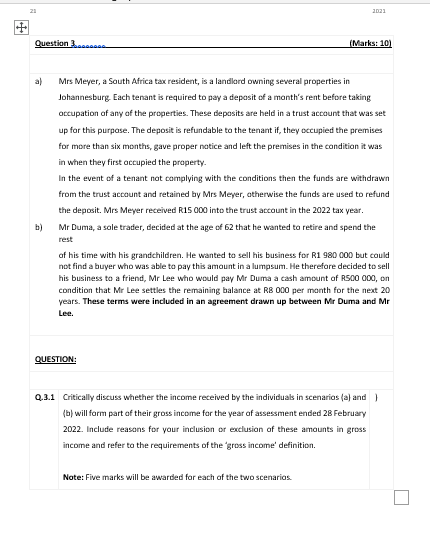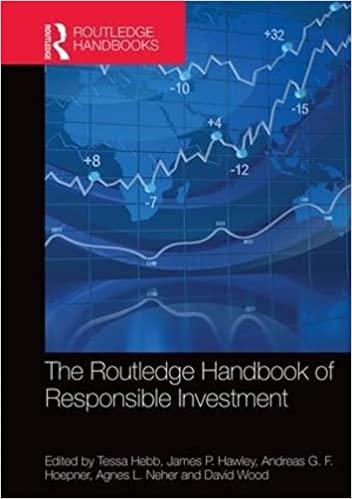
2021 Question (Marks 101 a) Mrs Meyer, a South Africa tax resident, is a landlord owning several properties in Johannesburg. Each tenant is required to pay a deposit of a month's rent before taking occupation of any of the properties. These deposits are held in a trust account that was set up for this purpose. The deposit is refundable to the tenant if they occupied the premises for more than six months, gave proper notice and left the premises in the condition it was in when they first occupied the property. In the event of a tenant not complying with the conditions then the funds are withdrawn from the trust account and retained by Mrs Meyer, otherwise the funds are used to refund the deposit. Mrs Meyer received R15 000 into the trust account in the 2022 tax year. Mr Duma, a sale trader, decided at the age of 62 that he wanted to retire and spend the rest of his time with his grandchildren. He wanted to sell his business for R1 980 000 but could not find a buyer who was able to pay this amount in alumpsum. He therefore decided to sell his business to a friend, Mr Lee who would pay Mr Duma a cash amount of R500 000, on condition that Mr Lee settles the remaining balance at R8 000 per month for the next 20 years. These terms were included in an agreement drawn up between Mir Duma and Mr Lee. b) QUESTION: Q.3.1 Critically discuss whether the income received by the individuals in scenarios (a) and (b) will form part of their gross income for the year of assessment ended 28 February 2022. Include reasons for your inclusion or exclusion of these amounts in gross income and refer to the requirements of the gross income' definition Note: Five marks will be awarded for each of the two scenarios - 2021 Question (Marks 101 a) Mrs Meyer, a South Africa tax resident, is a landlord owning several properties in Johannesburg. Each tenant is required to pay a deposit of a month's rent before taking occupation of any of the properties. These deposits are held in a trust account that was set up for this purpose. The deposit is refundable to the tenant if they occupied the premises for more than six months, gave proper notice and left the premises in the condition it was in when they first occupied the property. In the event of a tenant not complying with the conditions then the funds are withdrawn from the trust account and retained by Mrs Meyer, otherwise the funds are used to refund the deposit. Mrs Meyer received R15 000 into the trust account in the 2022 tax year. Mr Duma, a sale trader, decided at the age of 62 that he wanted to retire and spend the rest of his time with his grandchildren. He wanted to sell his business for R1 980 000 but could not find a buyer who was able to pay this amount in alumpsum. He therefore decided to sell his business to a friend, Mr Lee who would pay Mr Duma a cash amount of R500 000, on condition that Mr Lee settles the remaining balance at R8 000 per month for the next 20 years. These terms were included in an agreement drawn up between Mir Duma and Mr Lee. b) QUESTION: Q.3.1 Critically discuss whether the income received by the individuals in scenarios (a) and (b) will form part of their gross income for the year of assessment ended 28 February 2022. Include reasons for your inclusion or exclusion of these amounts in gross income and refer to the requirements of the gross income' definition Note: Five marks will be awarded for each of the two scenarios







